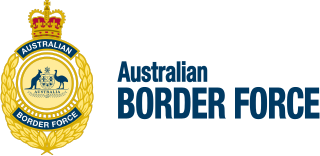
The Australian Federal Police (AFP) is the national and principal federal law enforcement agency of the Australian Government with the unique role of investigating crime and protecting the national security of the Commonwealth of Australia. The AFP is an independent agency of the Attorney-General's Department and is responsible to the Attorney-General and accountable to the Parliament of Australia. As of October 2019 the Commissioner of the Australian Federal Police is Reece Kershaw, formerly the Northern Territory Police Commissioner.

Law enforcement in Australia is one of the three major components of the country's justice system, along with courts and corrections. Law enforcement officers are employed by all three levels of government – federal, state/territory, and local.
The Australian High Tech Crime Centre (AHTCC) are hosted by the Australian Federal Police (AFP) at their headquarters in Canberra. Under the auspices of the AFP, the AHTCC is party to the formal Joint Operating Arrangement established between the AFP, the Australian Security Intelligence Organisation and the Computer Network Vulnerability Team of the Australian Signals Directorate.

The Australian Criminal Intelligence Commission (ACIC) is a law enforcement agency established by the Australian federal government on 1 July 2016, following the merger of the Australian Crime Commission (ACC) and CrimTrac. It has specialist investigative capabilities and delivers and maintains national information sharing systems. ACIC is part of the National Intelligence Community.

Michael Joseph Keelty is a retired Australian Police Commissioner of the Australian Federal Police from 2001 to 2009. He was also the inaugural chairperson of the Australian Crime Commission, now known as the Australian Criminal Intelligence Commission.

The Commonwealth Police (COMPOL) was the federal law enforcement agency in Australia between 1917 and 1979. A federal police force was first established in 1917, and operated under different names and in some periods as multiple organisations. In late 1979, the Commonwealth Police and Australian Capital Territory Police were merged to form the Australian Federal Police (AFP).
The Australian Protective Service (APS) was an Australian Commonwealth law enforcement agency which existed between October 1984 and June 2004. The APS was created by the separation of the Uniformed Protective Service component of the Australian Federal Police (AFP) into a new agency based upon recommendations contained in the Stewart Royal Commission of Inquiry into Drug Trafficking. It was initially responsible for protecting personnel and property of the Australian government; foreign diplomatic missions in both Australia and overseas, Internationally Protected Persons (IPPs); and the provision of custodial services at immigration detention centres. The APS provided a uniformed protection presence at most sensitive government establishments through either a permanent guarding presence or mobile patrol and alarm response function.
The Australian Intelligence Community (AIC) and the National Intelligence Community (NIC) or National Security Community of the Australian Government are the collectives of statutory intelligence agencies, policy departments, "illegals" - and other government agencies concerned with protecting and advancing the national security and national interests of the Commonwealth of Australia. The intelligence and security agencies of the Australian Government have evolved since the Second World War and the Cold War and saw transformation and expansion during the Global War on Terrorism with military deployments in Afghanistan, Iraq and against ISIS in Syria. Key international and national security issues for the Australian Intelligence Community include terrorism and violent extremism, cybersecurity, transnational crime, the rise of China, and Pacific regional security.

The Attorney-General's Department, also known as the Department of the Attorney-General or AG's Department, is the national law enforcement and justice department of the Australian Government. The attorney-general's department is responsible for the enforcement and compliance of federal law, the administration of justice and the oversight of industrial relations affairs. The department oversees various agencies including the Australian Security Intelligence Organisation (ASIO), Australian Federal Police (AFP), Australian Human Rights Commission (AHRC) and the Director of Public Prosecutions.

The Environment Protection and Biodiversity Conservation Act 1999(Cth) is an Act of the Parliament of Australia that provides a framework for protection of the Australian environment, including its biodiversity and its natural and culturally significant places. Enacted on 17 July 2000, it established a range of processes to help protect and promote the recovery of threatened species and ecological communities, and preserve significant places from decline. The Act is as of September 2024 administered by the Department of Climate Change, Energy, the Environment and Water. Lists of threatened species are drawn up under the Act, and these lists, the primary reference to threatened species in Australia, are available online through the Species Profile and Threats Database (SPRAT).
Until July 2012 the Specialist Response and Security Team (SRS) was a Police Tactical Group of the Australian Federal Police (AFP) having responsibility for tactical and specialist operations within the Australian Capital Territory. The Operational Response Group (ORG) had responsibility for AFP National and International tactical operations. In July 2012 the SRS was merged with the ORG to create the Specialist Response Group.
Police tactical group (PTG) is the generic term used to refer to highly trained Australian and New Zealand police tactical units that tactically manage and resolve high-risk incidents, including sieges, armed-offender situations and terrorist incidents.
Muhamed Haneef is an Indian-born doctor who was falsely accused of aiding terrorists, and left Australia upon cancellation of his visa amid great political controversy. His visa was later reinstated and he was given some compensation.
A law enforcement agency (LEA) has powers, which other government subjects do not, to enable the LEA to undertake its responsibilities. These powers are generally in one of six forms:

Tony William Negus is an Australian diplomat and retired police officer who was the Commissioner of the Australian Federal Police (AFP), being sworn in on 7 September 2009 for a five-year term. He was the sixth Commissioner of the AFP and the second appointed from within the AFP. On 1 December 2014, he was appointed Australian High Commissioner to Canada, effective on 15 January 2015.

The Queensland Council for Civil Liberties (QCCL) is a voluntary organisation in Australia concerned with the protection of individual rights and civil liberties. It was founded in 1966 in order "to protect and promote the human rights and freedoms of Queensland citizens." The QCCL is regularly asked by the Government to make submissions to committees, which is how bills are made in Parliament. These submissions cover issues such as closed circuit television, abortion law reform, sentencing issues in our court system and changes to legislation already in place, which are called amendments.

The Australian Border Force (ABF) is a federal law enforcement agency, part of the Department of Home Affairs, responsible for offshore and onshore border enforcement, investigations, compliance, detention operations and customs services in Australia. Through the ABF's Marine Unit, the ABF performs Coast Guard and marine law enforcement duties and is a component of the Maritime Border Command. The ABF is also part of the National Intelligence Community and is an active member of the World Customs Organization.

The Telecommunications Act 1979 is an Act of the Parliament of Australia which prohibits the unauthorised interception of communications or access to stored communications, with certain exceptions. The Act was amended by the Telecommunications Amendment Act 2015.

The Telecommunications (Interception and Access) Amendment (Data Retention) Act 2015(Cth) is an Act of the Parliament of Australia that amends the Telecommunications (Interception and Access) Act 1979 (original Act) and the Telecommunications Act 1997 to introduce a statutory obligation for Australian telecommunication service providers (TSPs) to retain, for a period of two years, particular types of telecommunications data (metadata) and introduces certain reforms to the regimes applying to the access of stored communications and telecommunications data under the original Act.
A spit hood, spit mask, mesh hood or spit guard is a restraint device intended to prevent a person from spitting or biting. The use of the hoods has been controversial, as they are a potential suffocation risk.










